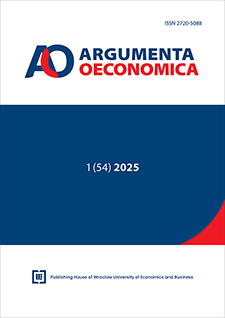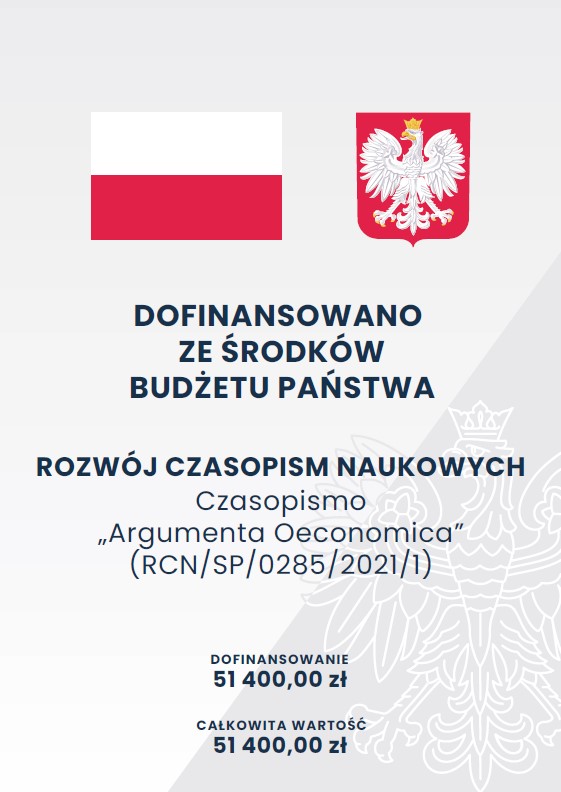The effect of stakeholder type and non-monetary incentive on the propensity to create a budgetary slack – an experimental study among controllers
DOI:
https://doi.org/10.15611/aoe.2025.1.02Keywords:
budgetary slack, stakeholders, stakeholder theory, incentives, controllers, ethicsAbstract
Aim: This study investigated whether the type of stakeholder and the presence of non-monetary incentives affect the controller’s propensity to create budgetary slack and examines the ethical evaluation of budgetary slack creation.
Methodology: The authors conducted an experiment among controllers working in Poland.
Results: Both incentive and stakeholder types can influence managers’ decision-making about budgetary slack. The ethical evaluation of budgetary slack was affected by the type of stakeholder.
Implications and recommendations: A negative ethical evaluation of budgetary slack does not always result in its non-acceptance, especially when the incentive is present and the stakeholder is defined by power, legitimacy, and urgency.
Originality/value: Budgetary slack is not widely accepted among Polish controllers, although the needs of production workers serve as ethical justification for creating it. This study expands existing management accounting by incorporating stakeholder issues into the budgetary slack creation problem, as well as contributes to the numerous stakeholder literature, especially to the ‘accounting for stakeholders’ concept.
Downloads
References
Agoglia, C. P., Hatfield, C. R., & Lambert, A. T. (2015). Audit team time reporting: An agency theory perspective. Accounting, Organizations and Society, 44, 1-14.
Allen, W. D., & Evans, D. A. (2005). Bidding and overconfidence in experimental financial markets. Journal of Behavioral Finance, 6(3), 108-120.
Andon, P., Baxter, J., & Chua, F. W. (2015). Accounting for stakeholders and making accounting useful. Journal of Management Studies, 52(7), 986-1002.
Bondy, K., & Charles, A. (2020). Mitigating stakeholder marginalisation with the relational self. Journal of Business Ethics, 165(1), 67-82.
Brown, J. L., Fisher, J.G., Sooy, M., & Sprinkle, G. B. (2014). The effect of rankings on honesty in budget reporting. Accounting, Organizations and Society, 39(4), 237-246.
Chow, C. W., Cooper, J., & Waller, W. (1988). Participative budgeting: Effects of a truth-inducing pay scheme and information asymmetry on slack and performance. The Accounting Review, 63(1), 111-122.
Church, B. K., Hannan, L. R., & Kuang, J. X. (2012). Shared interest and honesty in budget reporting. Accounting, Organizations and Society, 37(3), 155-167.
Church, B. K., Kuang, J. X., & Liu, Y. (2019). The effects of measurement basis and slack benefits on honesty in budget reporting. Accounting, Organizations and Society, 72, 74-84.
Church, B., Gaa, C. J., Khalid Nainar, S. M., & Shehata, M. M. (2005). Experimental evidence relating to the person-situation interactionist model of ethical decision making. Business Ethics Quarterly, 15(3), 363-383.
Davis, S., DeZoort, T. F., & Kopp, S. L. (2006). The effect of obedience pressure and perceived responsibility on management accountants’ creation of budgetary slack. Behavioral Research in Accounting, 18(1), 19-35.
Deegan, C., & Blomquist, C. (2006). Stakeholder influence on corporate reporting: An exploration of the interaction between WWF-Australia and the Australian minerals industry. Accounting, Organizations and Society, 31(4-5), 343-372.
Deng, D., Liu, J. Y. L., & Wen, S. (2020). The impact of accountability-oriented control aspects of variance investigation on budgetary slack and moderating effect of moral development. Frontiers in Psychology, 11, 583643.
Donaldson, T., & Preston, E. L. (1995). The stakeholder theory of the corporation: Concepts, evidence, and implications. Academy of Management Review, 20(1), 65-91.
Douglas, P. C., & Wier, B. (2000). Integrating ethical dimensions into a model of budgetary slack creation. Journal of Business Ethics, 28(3), 267-277.
Douglas, P. C., & Wier, B. (2005). Cultural and ethical effects in budgeting systems: A comparison of U.S. and Chinese managers. Journal of Business Ethics, 60(2), 159-174.
Dunk, A. S., & Nouri, H. (1998). Antecedents of budgetary slack: A literature review and synthesis. Journal of Accounting Literature, 17, 72-96.
Feng, Ch., Wang, H., Lu, N., Chen, T., He, H., Lu, Y., & Tu, X. M. (2014). Log-transformation and its implications for data analysis. Shanghai Archives of Psychiatry, 26(2), 105-109.
Fischer, C. M., Wartick, M. & Mark, M. M. (1992). Detection probability and taxpayer compliance: A review of the literature. Journal of Accounting Literature, 11, 1-46.
Floyd, E. & List, J. A. (2016). Using field experiments in accounting and finance. Journal of Accounting Research, 54(2), 437-475.
Freeman, R. E. (1984). Strategic management: A stakeholder approach. Pitman.
Freeman, R. E. (2017). Five challenges to stakeholder theory: A report on research in progress. Stakeholder management (Business and Society), 360(1), 1-20.
Freeman, R. E., Harrison, S. J., Wicks, C. A., Parmar, L. B. & de Colle, S. (2010). Stakeholder theory: The state of the art. Cambridge University Press.
Freeman, R. E., Phillips, R. & Sisodia, R. (2020). Tensions in stakeholder theory. Business & Society, 59(2), 1-19.
Harrel, A., & Harrison, P. (1994). An incentive to shirk, privately held information, and managers’ project evaluation decisions. Accounting, Organizations, and Society, 19(7), 569-577.
Harrison, J. S., & Wicks, C. A. (2021). Harmful stakeholder strategies. Journal of Business Ethics, 169(3), 405-419.
Hartmann, F. G. H., & Maas, S. V. (2010). Why business unit controllers create budget slack: Involvement in management, social pressure, and Machiavellianism. Behavioral Research in Accounting, 22(2), 27-49.
Hasseldine, J., & Hite, A. P. (2003). Framing, gender and tax compliance. Journal of Economic Psychology, 24(4), 517-533.
Hobson, J. L., Mellon, J. M., & Stevens, E. D. (2011). Determinants of moral judgments regarding budgetary slack: An experimental examination of pay scheme and personal values. Behavioral Research in Accounting, 23(1), 87-107.
Huang, Ch.-L., & Chang, B.-G. (2010). The effect of managers’ moral philosophy on project decisions under agency problem conditions. Journal of Business Ethics, 94, 595-611.
Huber, C., & Kirchler, M. (2023). Experiments in finance: A survey of historical trends. Journal of Behavioral and Experimental Finance, 37, 100737.
Jones, T. M., (1995). Instrumental stakeholder theory: A synthesis of ethics and economics. Academy of Management Review, 20(2), 404-437.
Libby, R., Bloomfield, R., & Nelson M. W. (2002). Experimental research in financial accounting. Accounting, Organizations and Society, 27, 775-810.
Kelly, M., & Alam, M. (2008). Management accounting and the stakeholder value model. Journal of Applied Management Accounting Research, 6(1), 75-86.
May, D. R., Li, C., Mencl, J., & Huang, Ch.-Ch. (2014). The ethics of meaningful work: Types and magnitude of job-related harm and the ethical decision-making process. Journal of Business Ethics, 121(4), 651-669.
Mendoza, K. I. (2019). Reducing underreporting by aggregating budgeted time. Accounting Review, 95(5), 299-319.
Miles, S. (2017). Stakeholder theory classification: A theoretical and empirical evaluation of definitions. Journal of Business Ethics, 142(3), 437-459.
Mitchell, R. K., Agle, R. B., & Wood, J. D. (1997). Toward a theory of stakeholder identification and salience: Defining the principle of who and what really counts. Academy of Management Review, 22(4), 853-886.
Moerman, L., & Van Der Laan, S. (2005). Social reporting in the tobacco industry: All smoke and mirrors? Accounting, Auditing and Accountability Journal, 18(3), 374-389.
Mohammadi, M. A. D., Khan, M. N. A. A., Ghasemi, R., & Mohamad, N. A. (2015). Management accounting system and shareholder versus stakeholder-oriented managerial decision-making. Middle-East Journal of Scientific Research, 23(9), 2145-2154.
Mohanna, D., & Sponem, S. (2020). The impact of the budget process on budgetary slack: The moderating role of uncertainty avoidance and individualism. Comptabilite Controle Audit, 26(2), 45-87.
Moll, J., & Hoque, Z. (2011). Budgeting for legitimacy: The case of an Australian university. Accounting, Organizations and Society, 36(2), 86-101.
Niesiobedzka, M., & Kolodziej, S. (2019). The impact of procedural fairness and extent of a tax loss or gain on the acceptance of tax authority decisions and the intention to appeal against them. Psychology, Public Policy, and Law, 25(1), 46-56.
Nikias, A. D., Schwartz, T. S., Spires, E. E., Rollscheid, J. W., & Young, A. R. (2010). The effects of aggregation and timing on budgeting: An experiment. Behavioral Research in Accounting, 22(1), 67-83.
Nowak, M., & Maruszewska, W. E. (2022). The joint effect of the type of stakeholder and incentive on the acceptance of budgetary slack. Observed differences in the hierarchy of needs indicated by Polish management accountants. Financial Sciences, 27(1), 14-27.
Nouri, H., & Parker, J. R. (1996). The effect of organizational commitment on the relation between budgetary participation and budgetary slack. Behavioral Research in Accounting, 8, 74-90.
Rankin, F. W., Schwartz, T. S., & Young, A. R. (2008). The effect of honesty and superior authority on budget proposals. Accounting Review, 83(4), 1083-1099.
Reynolds, S. J., Schultz, C. F., & Hekman, R. D. (2006). Stakeholder theory and managerial decision-making: Constraints and implications of balancing stakeholder interests. Journal of Business Ethics, 64(3), 285-301.
Rickman, N., & Witt, R. (2008). Favouritism and financial incentives: A natural experiment. Economica, 75(298), 296-309.
Ritter, B. A. (2006). Can business ethics be trained? A study of the ethical decision-making process in business students. Journal of Business Ethics, 68(2), 153-164.
Rutledge, R. W., & Karim, E. K. (1999). The influence of self-interest and ethical considerations on managers’ evaluation judgments. Accounting, Organizations and Society, 24, 173-184.
Salterio, S., & Koonce, L. (1997). The persuasiveness of audit evidence: The case of accounting policy decisions. Accounting, Organizations, and Society, 22(6), 573-587.
Stevens, J. (1996). Applied multivariate statistics for the social sciences (3rd ed.). Lawrence Erlbaum Associates.
Valcanover, V. M., Sonza, I. B., & da Silva, W. V. (2020). Behavioral finance experiments: A recent systematic literature review. SAGE Open, 10(4).
Vittel, S. J., & Festervand, A. T. (1987). Business ethics: Conflicts, practices and beliefs of industrial executives. Journal of Business Ethics, 6, 111-122.
Downloads
Published
License
Copyright (c) 2025 Ewa Wanda Maruszewska, Marta Nowak

This work is licensed under a Creative Commons Attribution-ShareAlike 4.0 International License.
Accepted 2024-04-08
Published 2025-02-11








